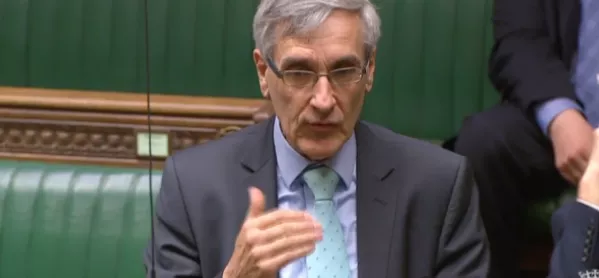Education secretary Damian Hinds has been confronted in Parliament by a senior member of his own party, who demanded urgent action over the fact that schools “simply don’t have enough” money.
A debate was called by Labour to press the government on its pledge that every school will see a cash increase under the new schools national funding formula.
Earlier this year, Mr Hinds was rapped by the UK Statistics Authority over the claim. This is because, in reality, it has been left to local authorities to decide how much money to allocate to each individual school.
But during today’s debate, Mr Hinds maintained that the formula would ensure that every school “attracts” more cash.
He said: “As well as making sure that every school attracts more money under the NFF, it does allocate the biggest increases to the schools that have historically been most under-funded.”
He also repeated previous statements that school funding levels are higher than they have ever been, and are being maintained in real terms until 2020.
‘We simply don’t have enough money’
However, former cabinet minister John Redwood (pictured), referring to per-pupil funding at schools in his Wokingham consituency, said: “We’re now at the point where it’s simply too little.”
He called for Mr Hinds to increase funding with “some urgency”, because “we simply don’t have enough [money]”.
Mr Hinds replied: “Thousands of schools will attract 3 per cent more per pupil this year and another 3 per cent next year.
“Some will attract even more, as a result of the minimum per-pupil funding levels, which mean every primary school will attract at least £3,500 and every secondary £4,800 by 2019-20.”
But, as Tes has previously revealed, these amounts are not guaranteed.
Mr Hinds was also challenged today to confirm whether he would resign if it turned out that not all schools were getting a cash increase.
Labour MP for Chesterfield Tony Perkins said: “He’s made a commitment that no school will actually see a cut in funding. I want to see what the strength of that guarantee is.
“So can he be clear, if it turns out a school actually has had a reduction in funding, would he consider that a resignation matter?”
Mr Hinds replied: “[The formula] allocates monies in respect of each school, and that is subject to set minimum cash increases.
“But there is flexibility for local authorities who have the very most up-to-date information about the profile of children in their schools, about special needs and free school meals and so on, to be able to reallocate money up to, you know, a certain limit.”
Mr Perkins pressed him again: “Is he saying there is a guarantee that no school will lose money? If there isn’t a commitment, he should say. If there isn’t then he shouldn’t hide behind councils.”
Mr Hinds said allowing local authorities to “reallocate” the school funding they receive from central government would “make sure that the funding goes to the places where it’s most needed”.




